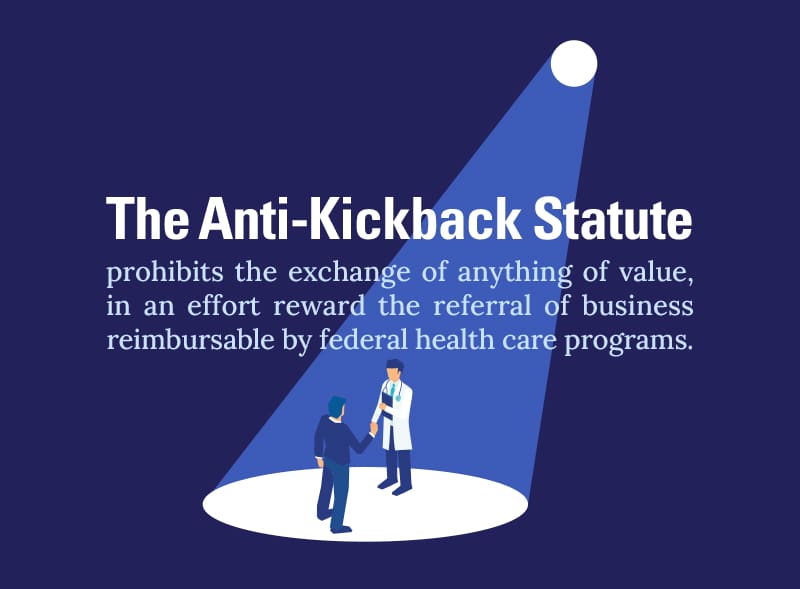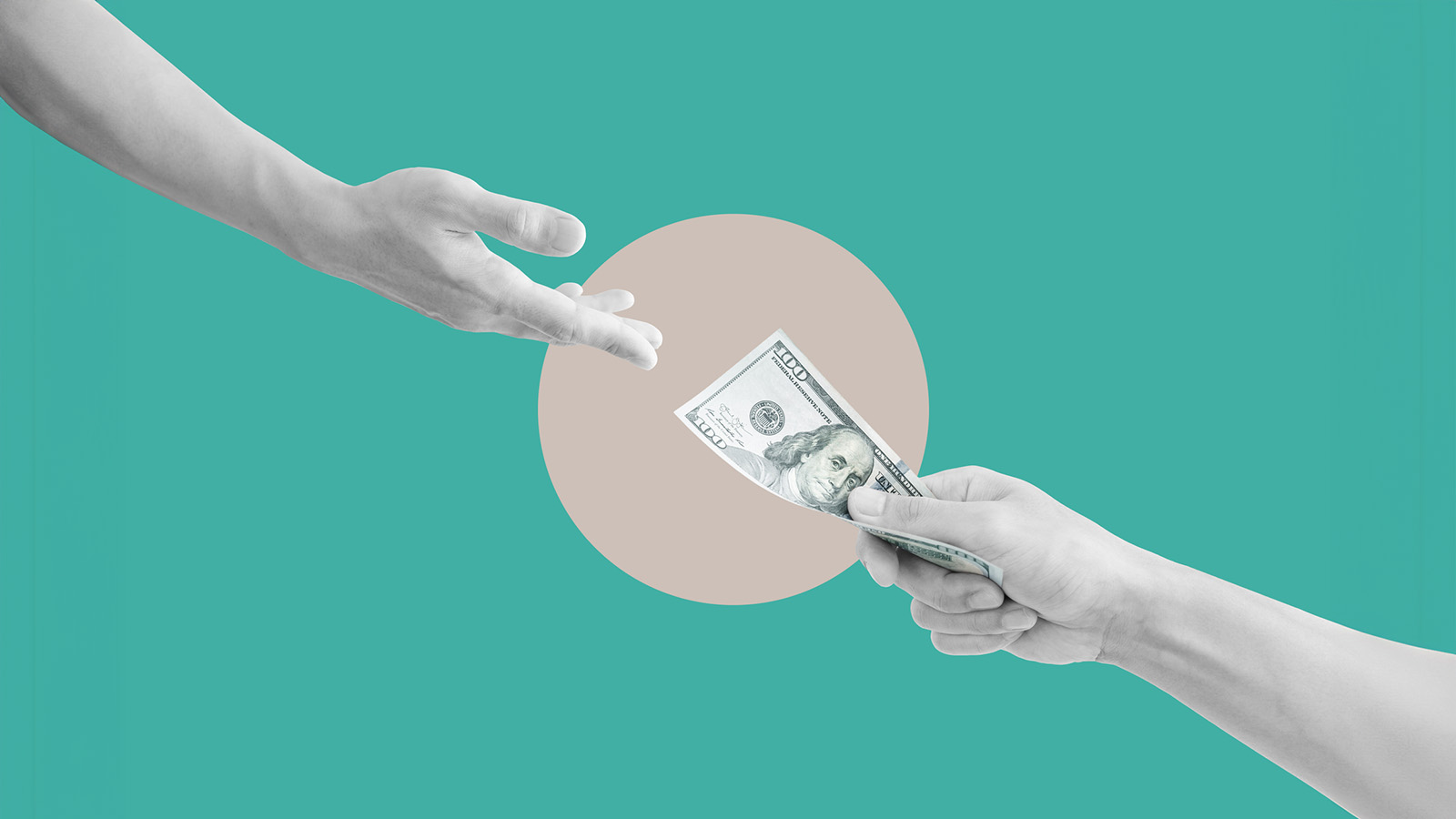What are Kickbacks?
Kickbacks often play a crucial role in fraud schemes designed to swindle taxpayer dollars from the United States Government. It is a general term used to describe the corrupt practice where illegal payments are made to garner preferential treatment and can be thought about as a form of bribery.
Updated
May 14, 2025

Kickbacks often play a crucial role in fraud schemes designed to swindle taxpayer dollars from the United States Government. It is a general term used to describe the corrupt practice where illegal payments are made to garner preferential treatment and can be thought about as a form of bribery.
Numerous federal laws and regulations prohibit kickbacks in association with federal programs and government contracting in which government funds are used. The government programs most affected by kickbacks in today’s world are federal healthcare programs like Medicare and Medicaid.
For example, multiple whistleblowers filed separate FCA qui tam lawsuits against Bristol Myers Squibb Co. alleging the company paid kickbacks to doctors to induce the submission of false claims to Medicare and Medicaid for Bristol Myers’ pharma products. Kohn, Kohn, and Colapinto represented the Bristol Myers sales agent, who received the largest individual whistleblower share of the more than $500 million recovered by the government.
Key Takeaways
- Kickbacks are illegal payments or transfers of things of value in exchange for preferential treatment.
- Kickbacks occurring in federal healthcare programs or government contracting often form the basis for liability under the False Claims Act.
- Direct cash payments, gifts, and overbilling constitute a violation of the Anti-Kickback Statute.
Kickback Definition
Generally, a kickback is an illegal payment or transfer of something of value in exchange for receiving preferential treatment for the goods or services provided by the person providing the bribe. These can take many forms including cash payments, gifts, inflated bills, or anything which has inherent value.
The common theme in all kickback schemes is that one party is providing value to another in order for the receiving party to use more or pay more for the payor’s goods or services. Both the party paying the kickback and the party receiving the kickback are acting corruptly and tainting the decision making process.
When using the term in relation to federal healthcare programs, a kickback is the improper payment of anything of value for the referral of a patient or the use of a medical products. Kickbacks can also appear as designated health services, the cost of which is reimbursed through Medicare, Medicaid, or another taxpayer funded program.
The Legality of Kickbacks

Two major laws govern kickbacks in the healthcare industry, the federal Anti-Kickback Statute (AKS) and the Stark Law.
The AKS is broader and prohibits anyone from knowingly and willfully offering or receiving any “remuneration” in exchange for referrals of goods or services where the cost of the items or services are ultimately reimbursed by federal healthcare programs. The AKS covers goods and services such as drugs, medical procedures, patient referrals, and more.
The Stark Law is narrower and deals exclusively with the referral of patients. The Stark Law prohibits physicians from referring Medicare or Medicaid patients to healthcare entities in which the referring physician has a financial interest. Physicians or doctors who violate the Stark Law can receive penalties such as exclusion from participation in federal healthcare programs such as Medicare and Medicaid and fines.
It is important to note that there are so-called “safe harbors” built into both the AKS and the Stark Law which allow some remuneration that would otherwise violate those statutes. However, in most cases kickbacks are illegal because healthcare providers are supposed to be making medical decisions based on what is best for the patient, not what is best for the physician’s pocketbook.
Kickback Examples
Some examples of common kickbacks in the healthcare industry include:
Gifts
Any gift of above nominal value, including things such as food, event tickets, and gift cards, is an improper kickback. If the purpose of giving the gift is to induce or reward referrals or preferential treatment for goods or medical services, this is considered a kickback. Also, providing gifts to physicians referring patients can, by itself, create an improper financial relationship between the referring physician and the entity providing the gift under the Stark Law.
Bribes
Bribes are straightforward types of kickbacks in which money or something of value is given specifically for the purpose of receiving preferential treatment. Beyond straight payments, healthcare providers and companies often disguise bribes as legitimate payments to physicians or other decision makers. A common way to do this has been to pay inflated rates for physicians to appear at speaking engagements.
Over Billing
Kickbacks can also occur through overbilling where a vendor submits inflated invoices for the goods or services it provided. A kickback is then provided, usually to a corrupt employee of the payor, for accepting and paying the excessive charges.
Diverting business to vendors
One of the most prevalent examples of kickbacks improperly influencing the decision of which vendor to use in the healthcare industry is when pharma companies provide remuneration for physicians to prescribe their products. As a result, physicians do not make medical decisions using their unbiased medical judgment, but rather choose to prescribe certain medicine to their patients for personal financial consideration.
Using payments or compensation to refer patient
Paying kickbacks for patient referrals is a very common violation and the reason the Stark Law exists. The government does not want patients being referred to other healthcare providers based on financial reward but rather what is in the best interest of the patient. By referring a patient to a certain healthcare provider in exchange for something of value, whether it be a direct payment or financial incentive due to ownership in the healthcare provider, this intent is subverted.
Conflict of Interest
Another common form of conflict is the involvement of family interests. In such case a spouse, a child, or another close family member is employed by the contractor, or goods and services are purchased from such a relative or the firm controlled by a relative.
False Claims Act: The Anti-Kickback Statute
The False Claims Act (“FCA”) was enacted to protect taxpayer dollars from fraud and holds parties liable who fraudulently seek payment from the government which they are not rightfully owed. Violations of the AKS and Stark Law can provide the basis for FCA liability.
“[o]ne of the most litigated areas of health care fraud involves claims for services that were performed, are medically necessary, or are charged at rates appropriate to the diagnostic code but are otherwise false because the patient was obtained as a result of an illegal kickback or referral . . .
Claims related to illegal kickbacks and referrals are simply not covered or payable by Medicare, and the submission of such claims violates the FCA.” United States v. General Dynamics Corp., 19 F.3d 770 (2d Cir. 1994).
Therefore, even if a certain procedure was necessary and all other regulations were followed, if the AKS or Stark Law were violated, all related claims for reimbursement under Medicare or Medicaid are violations of the FCA.
Government Contracting Fraud and Kickbacks
Apart from federal healthcare programs, kickback schemes are also prevalent in government procurement and contracting. A separate set of statutes and regulations govern kickbacks for those who directly, or indirectly through subcontracting, enter into contracts with the United States to provide goods or services.
Similarly to healthcare industry, it is prohibited for contractors, subcontractors, and their employees to provide, solicit, or accept anything of value in exchange for favorable treatment on a government contract or subcontract. Like with kickbacks involving taxpayer funded healthcare, violations of government contracting kickback rules can be the basis for FCA liability.
Rewards for Reporting Kickbacks and Other Healthcare Fraud
For any monetary recovery for the United States that results from a qui tam FCA case, the whistleblower who filed the case is entitled to a 15-30% share. The FCA and underlying kickback laws are highly nuanced and therefore you should consult with a qui tam attorney to determine the validity of any potential FCA case, including those involving kickbacks.
How to Report Kickbacks
Federal agencies such as the Department of Health and Human Services (HHS) have Inspector General and Ombudsman offices that employees can report to if they witness fraud. However, it is best practice to contact an experienced whistleblower attorney before you contact any hotline or internal whistleblower office.
Our Firm’s Cases

Contract Fraud Exposed
Dr. Tommie Savage, a seasoned contracting officer at the Army Corps of Engineers, uncovered a web of systemic corruption within the agency's Huntsville, Alabama contracting office. Her unwavering commitment to ethical government practices led to a relentless campaign of retaliation that would test her resilience and courage.

Qui Tam Victory
Whistleblower Bryan Swanton's qui tam lawsuit led to a $625,000 settlement against Instec Inc. for falsely claiming its Chinese-made scientific instruments were manufactured in the U.S. to secure government contracts.

Lives Saved
Dr. Aaron Westrick filed a False Claims Act lawsuit against Toyoba, the manufacter of Zylon fiber, a material that degraded over time, which put thousands of lives in American police departments, federal law enforcement agencies, and the U.S. military at risk.
Relevant FAQs
Latest News & Insights
Our pro bono team has helped lead the fight to pass amendments which would strengthen the False Claims Act (FCA).





